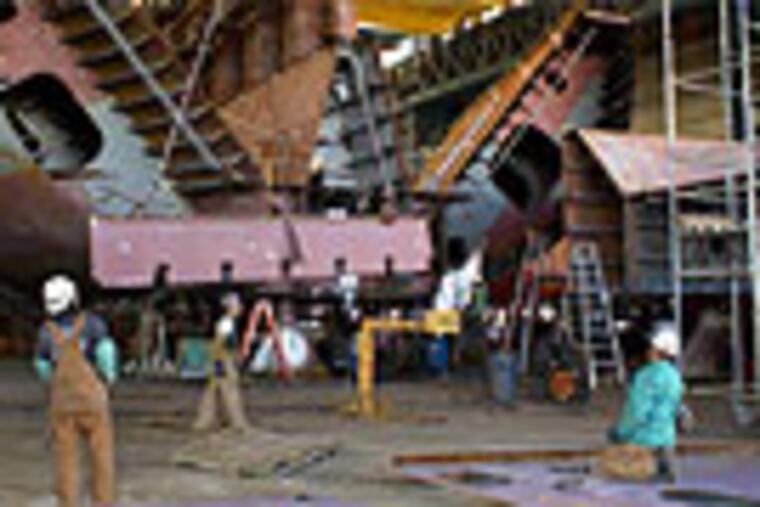Phila. shipbuilder seeks help to stay afloat
Aker Philadelphia Shipyard says it needs to borrow $150 million to construct two tankers, for which it has already ordered parts but has no buyers.

Aker Philadelphia Shipyard says it needs to borrow $150 million to construct two tankers, for which it has already ordered parts but has no buyers.
If it does not get the money or sell the ships, the second-largest U.S. commercial shipbuilder may ultimately have to shut its operations at the Navy Yard, the company and government officials say.
In a normal economy, Aker would borrow from a bank, but with credit impossible to get, Aker is seeking a $150 million "bridge loan" from the Maritime Administration of the U.S. Department of Transportation.
The shipbuilder appealed last week to Philadelphia port officials and to state and federal lawmakers to help with what it called "an immediate and serious challenge" that could result in layoffs of 1,200 workers beginning in March.
Aker said it would put up $40 million of its own money, or just over 20 percent of the total $190 million cost, to build the two tankers. But the shipbuilder still needs an additional $15 million in federal maritime funds to secure the $150 million loan.
The Philadelphia Regional Port Authority board voted unanimously Wednesday to support Aker's getting the $15 million from an existing maritime appropriation that has not been spent.
Legislation will be required by Congress to "reprogram" the maritime grant and approve the loan before a buyer is found for the ships.
"We need a bridge to get to better times," Aker president and chief executive officer Jim Miller said yesterday. "This is a good company. This is a good industry. There are good long-term market dynamics."
Gov. Rendell wrote Vice President Biden on Sept. 10 that without short-term credit help, Philadelphia's shipyard "is in danger of beginning the systematic closure of its operation in March 2010."
If funds are not committed by the end of October, Rendell said, Aker will initiate layoffs in March, terminate vendor and supplier contracts, and cease operations in March 2011.
"It is unlikely the shipyard will ever reopen once the workforce is lost, production ceases, and financial losses accumulate," Rendell wrote.
Aker delivered its seventh product tanker in June and has orders for five more.
The federal loan will be used to build two tankers after the current backlog of five.
"We represent 50 percent of the commercial shipbuilding in the U.S.," Miller said. "It is important not only to us and to the state, but also to the industry that we are able to cross this bridge. The industry could be hampered if it lost any of that capacity."
The challenge is short-term because Aker stands to get shipbuilding work in the next five to seven years when much of the domestic fleet will need to be replaced, short sea shipping operations will begin, and offshore wind-energy projects will take root, Rendell said.
As a result of the oil-pollution act passed after the Exxon Valdez oil spill, single-hull ships must be replaced by 2015 with double-hull vessels that have an additional layer between their oil tanks and the oceans.
Aker estimates there are 15 older tankers at sea that must be replaced or scrapped to comply with the law.
"We don't want to see 1,200 jobs go away," Philadelphia Regional Port Authority chairman John Estey said. "Plus the region has invested a lot of money" - a $429 million taxpayer-funded shipbuilding subsidy in the 1990s to Aker's predecessor, Kvaerner Philadelphia Shipyard.
In 2000, Aker, a unit of Norway based Aker ASA, took over the Kvaerner yard.
Aker builds ships under the U.S. Jones Act, an 89-year-old law intended to protect national security and U.S. shipbuilding by allowing only U.S.-made vessels to carry cargo between U.S. ports.
Aker, which is second in size to General Dynamics Nassco of San Diego as a commercial shipbuilder, contributes $230 million annually to the region's economy in wages, taxes, and 7,000 jobs indirectly related to shipbuilding, Rendell told Biden.
It takes Aker about 16 months to build a 10,000-ton tanker at a cost of about $100 million.
Because of the time required to get parts, such as engines, Aker made financial commitments last year to build two additional tankers.
"We are making a lot of efforts directly with clients to try to sell ships," Miller said. "We are going to continue to do that, as well as pursue other alternatives to make sure we're able to continue our momentum without any disruption."
"This is a darn fine company," he said. "One way or another, I am going to make this happen."